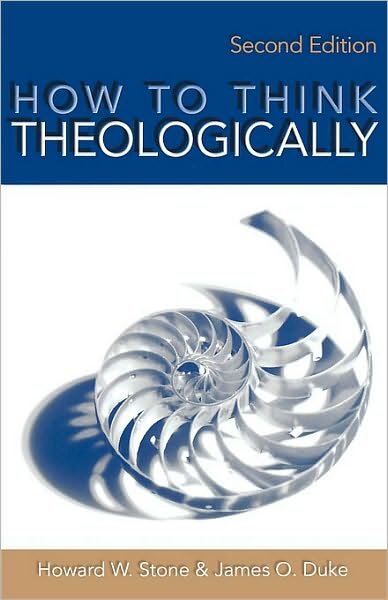Howard W. Stone and James O. Duke, How to Think Theologically. Third Edition. Fortress Press, 2013.
Referenced in: Pastoral Theology
LifeandLeadership.com Summary
This is a primer on “practical” theology that is not limited to the pastoral role, but covers a wide range of issues Christians encounter, equipping them to engage them theologically. It is not a technical discussion of the major doctrines of the Christian faith that synthesizes the witness of great theologians past and present. It affirms that value of such texts, but the authors’ main purpose is to equip readers for ongoing theological reflection about real-life situations, including congregational matters. While a book on spiritual formation might be an invitation to a contemplative life, this book is an invitation to a theologically reflective life, but in less technical terms. What technical terms it uses, it carefully defines, with an excellent glossary in back. The book is also full of helpful case studies.
The book weaves two common techniques throughout all of its suggestions: listening and questioning. The authors define:
“Listening involves an active waiting that allows new information in, is prepared to be surprised, remains open to the illumination of the Spirit. Questioning is a corrective to complacency – the danger of becoming satisfied with old answers and preconceptions. We subject our own answers of yesterday to fresh questioning in order to embrace new situations and new insights. The aim of listening is receptivity; the aim of questioning is honesty. …The ultimate goal of the process is the maturing of our theological understanding.” (viii)
The first three chapters discuss why and how Christians should do theology. Chapters 4 through 7 offer a theological method for thinking through issues such as the gospel, the human condition, and Christian vocation. Chapter 8 considers how to do such reflection in the context of community. Chapter 9, “Forming Spirit” mentions the spiritual disciplines that are important for theological reflection.
Although this book is intended for everyone because “every Christian is a theologian,” its style and content will be better appreciated by those who are theologically trained.
From the Publisher
A primer on theological reflection –
Howard Stone and James Duke content that theology is not an optional, esoteric indulgence but instead a vital, practical skill by which people can make religious sense of concrete life situations and fulfill their intellectual vocations as Christians. So they have composed a successful theological primer for everyone.
Again in this second edition, fully updated and expanded, Stone and Duke’s lucid and lively text helps readers to probe their own theological roots and advance to a more deliberative appreciation and creative application of their embedded faith convictions. Addressing the how and why of theological sources, moves, and methods, Stone and Duke guide readers into major theological topics – gospel, sin and salvation, vocation, ethical discernment – through real-life case studies.
About the Authors
James O. Duke is Professor of History of Christianity and Historical Theology at Brite Divinity School, Texas Christian University, Fort Worth.
Howard W. Stone is Professor of Pastoral Theology and Pastoral Counseling at Brite Divinity School, Texas Christian University. Among his many influential books are Brief Pastoral Counseling, Crisis Counseling, and (with James O. Duke) How to Think Theologically, all from Fortress Press. He is also the editor of the Fortress Press series Creative Pastoral Care and Counseling.
***For additional information on this resource, including reviews, click the bookstore links. Check the reference at page top or the links below for resource guides on related topics.***
See Other Resource Guides on Pastoral Theology:
- Minister Self-Care
- Ministry Burnout, Prevening and Overcoming
- Ministry Ethics
- Ministry Support Systems
- Strengthening and Renewing the Ministry Call
- Theology of Mission and Ministry
See Resources on Over 100 Ministry Topics:


